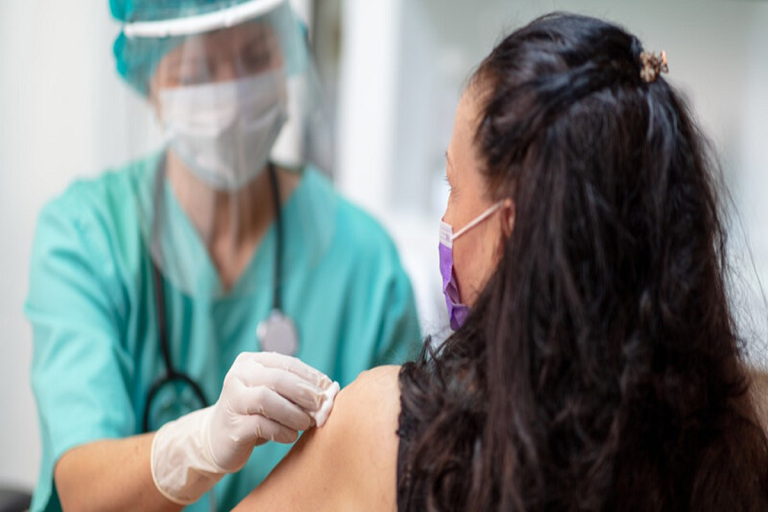J&J pause could create challenges for vaccine scheduling, reporting systems
Officials at CDC and FDA said they wanted to prepare healthcare providers to recognize and treat patients appropriately – and to report adverse events they may be seeing.
The U.S. Centers for Disease Control and the Food and Drug Administration issued a joint statement on Tuesday recommending a pause in the use of the Johnson & Johnson vaccine while “extremely rare” adverse events are being investigated.
According to the press release, six women between the ages of 18 and 48 developed a blood clot called cerebral venous sinus thrombosis, seen in combination with low levels of blood platelets, between six and 13 days after vaccination.
“We’re recommending this pause while we work together to fully understand these events and also so we can get information out to healthcare providers and vaccine recipients,” said Dr. Janet Woodcock, acting FDA commissioner, during a media call on Tuesday.
“Right now, I’d like to stress these events appear to be extremely rare,” said Woodcock. “However, COVID-19 vaccine safety is a top priority for the federal government, and we take all reports of adverse events following vaccination very seriously.”
IT experts noted how the action could lead to further confusion in an already beleaguered vaccine scheduling system.
“This Johnson & Johnson news impacts the previously planned vaccination rollout, reduces the number of vaccines available for appointments, and presents new issues with prioritizing patients at the state and local level,” said Pouria Sanae, CEO of the health testing technology platform ixlayer.
WHY IT MATTERS
Agency representatives noted that treatment for CVST is different from other types of blood clots. Of the post-vaccine CVST cases in the United States, one case was fatal, and one patient is in critical condition.
“The FDA will revise the fact sheet for healthcare providers administering the vaccine … to ensure healthcare providers are able to make appropriate benefit-risk determinations for their patients,” said Dr. Peter Marks, director of the FDA Center for Biologics Evaluation and Research.
Marks advised healthcare providers who encounter patients with a low blood platelet count or blood clots to establish whether the individual has recently been vaccinated in order to inform the appropriate diagnostic management.
CDC Principal Deputy Director Dr. Anne Schuchat acknowledged that the information may sound alarming. She noted that more than 6 million J&J vaccine doses have been administered and that six cases of this “stroke-like” adverse event have been reported.
Marks noted that the “background rate” – meaning expected incidence – for CVST is somewhere between two and 14 per million people, but that the occurrence with low platelet count makes a similar pattern to that seen in Europe with a different vaccine.
An independent committee will convene on Wednesday, said Schuchat, to deliberate existing information and to consider next steps. That review may include weighing the risks and benefits for certain subsets of the population.
Woodcock said the timeframe will depend on what federal agencies learn, but that she expected the pause to be a “matter of days.”
“I know there are people who have gotten the vaccine who are probably very concerned,” said Schuchat. She advised that those who have recently gotten J&J doses look out for severe headaches, abdominal pain, leg pain or shortness of breath.
“This may be a bit bumpy,” she said about the rescheduling process for existing appointments.
COVID-19 itself carries a risk of blood clots, although treatment for those differs from CVST. “If one administers the standard treatments that we as doctors have learned to give for blood clots, one can actually cause tremendous harm,” said Marks.
As Sanae noted, the news suggests the potential usefulness of cloud infrastructure that could respond to such uncertainties.
“Vaccination sites, enterprises and patients need a cloud infrastructure that’s able to quickly configure and adapt to sweeping changes that affect the ‘last mile’ of COVID-19 vaccines – the process that manages everything once the vaccine makes it to the distribution center and ends with patient follow-ups,” he said.
“In order to find potential correlations between adverse reactions and vaccinations, we need a cloud-based and patient-centered [customer relationship management] portal that documents reactions and side effects in conjunction with that patient’s health and medical records,” he continued.
“Vaccination is a mass-scale clinical trial that doesn’t end after the shot is given,” he added. “Having the right cloud infrastructure can help build the connection between the patient, physician and enterprise as they work together to identify and implement future changes and adjustments for the vaccines.”
THE LARGER TREND
Experts say the COVID-19 vaccine rollout – and the novel coronavirus response in general – has shined a light on the need for a unified federal framework for disease management.
Whether it comes to collecting patient data, scheduling vaccines or tracking adverse events, the process has largely been patchwork, sometimes leading to confusion or inequity.
Some progress on this issue is being made: The most recently passed COVID-19 relief bill included $500 million for a data modernization and forecasting center at the CDC, which would go toward establishing, expanding and maintaining efforts to modernize the United States disease warning system to forecast and track hotspots for COVID-19.
ON THE RECORD
“The steps we’re taking today are meant to make sure that the healthcare system is ready to diagnose, treat and report, and that you, the American public, have the information you need to stay safe,” said Schuchat.






























